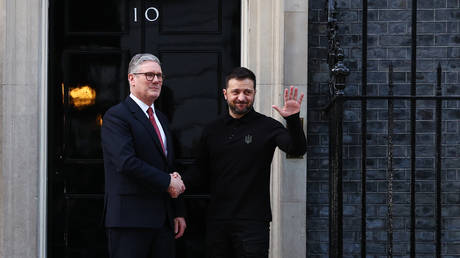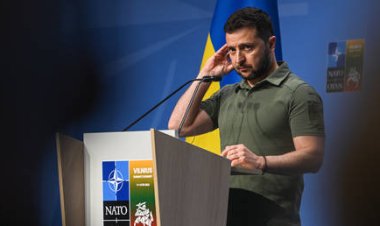Fyodor Lukyanov: The EU Confronts an Apocalyptic Choice Involving Trump
Explore how the absence of the US could lead to the disintegration of the bloc's strategy concerning Ukraine. Read the full article at RT.com.

The dramatic developments at the White House on Friday night, involving Ukraine’s President Vladimir Zelensky, have left Western Europe in a precarious predicament. Many leaders in the region, varying from moderate to outspoken critics of US President Donald Trump, have nevertheless sought to maintain the long-standing transatlantic alliance. They have urged Washington to pursue a resolution to the Ukraine conflict that is consistent with European interests. However, the now-public rift between Zelensky and Trump has eliminated that opportunity.
Whether intentional or not, Zelensky has compelled the United States to clarify its position: Washington is a mediator, not a combatant, focusing on de-escalation rather than choosing sides. This represents a significant shift from the previous stance in which the US spearheaded a Western coalition against Russia in support of Ukraine. The implication is clear—American backing for Kyiv is not driven by principle but is instead a tool in a larger geopolitical strategy.
**Western Europe’s Limited Options**
The EU has vocally asserted that it will never abandon Ukraine. Nonetheless, it lacks the necessary resources to serve as Kyiv’s primary supporter in the absence of the United States. Reversing course is also complex; the cost associated with attempting to defeat Russia is exorbitant, and the economic ramifications are daunting. Any sudden change in policy would require Western European leaders to justify their prior decisions. In an EU already facing internal unrest, such a reversal would provide ammunition to political opponents of the bloc's leaders.
Another reason Western Europe continues on this path is its post-Cold War reliance on moral arguments as a political strategy—both domestically and in interactions with external partners. Unlike sovereign states, the EU is not a singular entity. Where individual nations can shift and adjust policies with relative ease, a coalition of over two dozen countries is often mired in bureaucracy. Decision-making is slow, coordination is imperfect, and mechanisms frequently fail to operate as intended.
For years, Brussels has sought to transform this structural weakness into ideological strength. The EU, despite its complexity, was meant to exemplify a new form of cooperative politics—a model for the world to emulate. However, it has become evident that this aspiration has faltered.
At best, it may persist within the culturally homogenous core of Western Europe, though even that is uncertain. The global landscape has evolved, and the inefficiencies remain. This renders the dream of an independent, self-sufficient “Europe”—capable of acting autonomously from American oversight—an unattainable goal.
**Adapting to Washington’s New Reality**
Western Europe may attempt to weather the disruptions of another Trump presidency, much like it did during his first term. However, this issue transcends Trump; the shift in US policy represents a broader political realignment, one that ensures there will be no return to the productive era of the 1990s and early 2000s.
More critically, Ukraine has become a catalyst for these transformations. The EU cannot afford the luxury of waiting. Its leaders must swiftly determine how to react. Most likely, they will seek to maintain the appearance of unity with Washington while adapting to new US policies. This will not be easy, especially from an economic standpoint. Unlike previous times, modern America prioritizes its interests with minimal concern for its European allies' needs.
An indicator of Western Europe’s changing stance may be the forthcoming visit of German Chancellor Friedrich Merz to Washington. Presently, Merz positions himself as a hardliner. However, if history is any indication, he may soon alter his stance to align more closely with Washington's new orientation.
**The alternative: Europe vs. America?**
There remains another possibility—the EU could strive to unify and resist Trump’s America. Yet, given the absence of capable leadership and the deep divisions within the bloc, this seems improbable. Ukraine could potentially serve as a unifying point for European solidarity, but public sentiment within many EU nations suggests otherwise.
Simultaneously, the assertive manner in which Washington now intervenes in European domestic politics—actively supporting populist movements favorable to Trump—could provoke an unexpected reaction. Western European elites might find themselves compelled to consolidate in response, while nationalists, who have long opposed external influence, may struggle to adapt to this new reality.
Regardless of the outcome, what we are witnessing is an internal crisis within the so-called “collective West.” The very concept of Western unity is under threat. Historically, the political West is a relatively recent construct, primarily a product of the Cold War. Even then, the relationship between the Old World and the New was frequently uneasy. In the 1940s and 1950s, despite its rivalry with the Soviet Union, the US actively encouraged the dismantling of European colonial empires, thereby asserting its dominance.
The response to Western Europe’s waning global influence at that time was deeper integration. While Trump now regards the European project as a failure, for decades, Washington viewed it as a means of streamlining Western politics and economics under American leadership. Today, that perspective has shifted. The US no longer perceives a strong, unified EU as an asset and is unabashed in expressing that viewpoint.
If Western European leaders choose to confront America, it could signify the commencement of a new chapter—one that may herald the definitive end of the Cold War framework that has shaped Western politics for decades.
**Russia’s perspective**
For Russia, a united and coordinated EU holds no strategic significance. The period when Moscow considered the idea of continental integration—including Russia—is long past. Experience, rather than time, has extinguished those illusions.
Moscow is now focused on pragmatic opportunities. The internal conflicts within the West are to be regarded solely through the lens of what tangible benefits can be extracted. Long-term strategic planning is irrelevant amidst such rapid geopolitical transitions. For now, the priority is to act decisively, to capitalize on the ongoing fractures, and to secure Russia’s interests within the evolving global order.
This article was first published by the newspaper Rossiyskaya Gazeta and has been translated and edited by the RTN team.
Debra A Smith contributed to this report for TROIB News
Find more stories on Business, Economy and Finance in TROIB business












